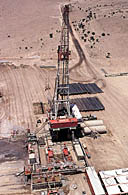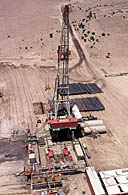
Technical Innovations for Yemen – 2 Synthetic Fuel from Natural Gas [Archives:1999/01/Science & Technology]
January 4 1999
By: Future Industries Consultants,
Sanaa
A new cost-effective process has been proposed to convert natural gas into liquid fuels and other products via the Fischer-Tropsch process. The key secret is a new catalyst that confirms product and quality yield. Synthetically-produced hydrocarbons are usually high-quality products and are free of sulfur, metals, particulates, and aromatics. Those criteria are environmentally preferred.

Secondly, the synthesis gas is converted into hydrocarbon chains of varying lengths. Nitrogen gas, which passes through the two steps and rejected to atmosphere, is used to remove reaction-generated heat. By eliminating the recycle-compressor loop, construction is cheaper.
The two steps are exothermic. Heat generated by the process and combustion of the tail gas are easily converted into plant power needs or exported as surplus high-pressure steam of electricity.
Yemeni wealth of natural gas is much more than its wealth of oil. A study has been performed by Hunt-Exxon a few years ago to convert natural gas into synthetic oil using Fischer-Tropsch process. The proposal was rejected as the project will not be profitable. Using the new technology will change the situation. Selling its natural gas as liquid fuel will be very profitable to Yemen. The tedious export processes of natural gas will be eliminated, starting from the special gas pipelines, cooling units and special export terminals to gas vessels.
The synthesis gas itself is an excellent starting material for many other petrochemicals beginning from ammonia and its subsequent fertilizer products and the highly demanded methanol and ending with the endless list of alcohols, aldehydes, acids and olefins.
Tackling this new technology will put Yemen into a new era of innovative petrochemical production. The issue is worth a study.
——
[archive-e:01-v:1999-y:1999-d:1999-01-04-p:./1999/iss01/techno.htm]


